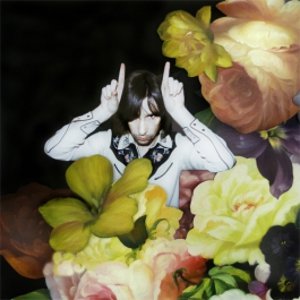Primal Scream have always been a hard band to really love. Their lurching from jangling dreamers (Sonic Flower Groove) to drug-touched genre benders (Screamadelica) to rock & roll chop boys (Give Out But Don’t Give Up) to dub warriors (Vanishing Point) and millennial digi-industrialists (XTRMNTR) was peculiar to witness, their intent hard to define. This flip-flopping, combined with remarkable inconsistency live (in my experience, Primal Scream gigs have veered between violent transcendence and watching a bunch of old drunks shouting for opening time through a closed pub window) meant it often felt that they were grasping at some dubious, mythical idea of what rock music is and can do, rather than achieving it. Yet part of the charm of Bobby G and co is that their evolution has felt heartfelt; naive even. The ‘we mean it, man’ vibe has been both their strength and weakness. Gillespie’s attempt to channel the ‘woah yeah bleeding spirit of rock & roll baaaaby‘ has a nasty tendency to involve him lolloping around the stage like a randy goat, and it’s often been hard to shake the suspicion that their finest, furthest out albums – Screamadelica and XTRMNTR – were achievements more of Primal Scream’s collaborators than the band themselves.
Since the magnificent XTRMNTR the band have slid into a creative rut, releasing record after record that seemed to reference bits and pieces of their back catalogue without ever really going anywhere new. More Light stands out, then, simply because on it Primal Scream seem to have made an effort.
With David Holmes producing, More Light is a bold record that stretches for 13 tracks, and runs to over an hour in length. It opens with State Of The Nation single ‘2013’, a nine-minute epic of lumbering percussion, twirling organs, a driving brass riff that skronks for England and a freak-out breakdown that really throws the kitchen sink – including the guitar line from The Fall’s ‘Sparta FC’ – at proceedings. Not only the best Primal Scream track since ‘Swastika Eyes’, its presence at the front of the album helps to swiftly despatch the elephant in the room – Bobby Gillespie’s very political lyrics. Is it incongruous hearing Gillespie singing "what happened to the voices of dissent / Getting rich I guess / become part of the establishment" when (even if he has given up the snifters with Kate Moss) he lives in pleasant, leafy North East London, sends his children to private school and fronts a band who are about as Brit indie establishment as you can get?
Perhaps Gillespie should be careful what he wishes for – come the revolution, flouncing aesthetes in nice shirts are frequently first against the wall. Yet let us not smirk – he’s rather damned if you don’t, damned if you do, and (largely due to how powerfully enjoyable the music is here) should be given the benefit of the doubt. The caricature that is Rock & Roll Rebel Gillespie is annoying partly because it’s crassly done – see the 2008 South Bank gig mutual jerk-off Primal Scream played with the The MC5, surely the Sid The Sexists of ‘radical’ rock. Here, by contrast, the relative power and ambition of the music and sense that Gillespie is putting a lot of himself into the piece carries all the lyrics of "21st century slaves", "Holocaust central howling at my back" and exhortations to "read your Marx & Engels / Be a situationist / like Guy Debord". We have a cultural squeamishness concerning political lyrics that’s becoming absurd, given the times we live in, and just how often do we hear a mainstream indie rock group at least actually try and say something, even if the hectoring is arguably based on a rather outdated model?
Primal Scream as a band are on form here, aided and abetted by Kevin Shields, Robert Plant, Woody Jackson and post-punk ploughman Mark Stewart, who turns up to give some querulous vocal and "jazz funk whistle" menace on the bruising ‘Culturecide’. ‘River Of Pain’, which connects the lack of meaning in the modern workplace with domestic violence, is the most subtle track here, acoustic guitars atop a discreet groove. ‘Hit Void’ is a righteous, noisy blaster up there with anything off XTRMNTR and ends with some more roaring brass, and ‘Invisible City’ is a taut and jaunty ode to London that I swear must have been written on a bus (or most likely in the back of a cab) up the Kingsland Road.
The more retro excursions are pretty solid too. ‘Tenement Kid’ sounds like The Beatles soundtracking a public information film, the mod psych of ‘Sideman’ is all handclaps and twitchy fringe swing, while ‘Relativity’ is an excellent piece of English psychedelia, sunshine twangs and Watership Down clarinet, a pastoral breakdown and chill out among the ruins as nature takes over after the detritus of insurrection (this stuff’s catching). ‘Goodbye Johnny’, meanwhile, sees Gillespie exploring his long-term love of Alan Vega’s digital take on rock & roll, and closer ‘It’s Alright, It’s OK’ is, yes, just about good enough to be excused for essentially being ‘Movin’ On Up’ MK II.
Whether new-found sobriety, passionate annoyance at the powers that be, or just the the inevitable ebb and flow of creativity within the dynamics of the band that’s to thank for it, More Light stands as one of Primal Scream’s finest, most honest records, even if the ravens remain soundly roosting within the Tower’s walls.


